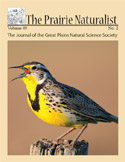Great Plains Natural Science Society

The Prairie Naturalist
Date of this Version
6-2007
Document Type
Article
Citation
The Prairie Naturalist 39(2): June 2007, pp 77-85
Abstract
Classical optimal foraging theory (OFT) predicts that an animal forages optimally when it chooses foods with the highest energy benefit or minimizes time searching for and handling food. r evaluated OFT by presenting eastern fox squirrel (Sciurus niger) multiple food items (i.e., sunflower seeds and • fruits) in various density combinations. When the choice was between foods of equal energy benefits but different costs, they chose forage items with greater costs, seemingly not foraging optimally. However, individuals showed a partial preference for food items which minimized search time, but not handling time. The eastern fox squirrel also was found to be a generalist forager with a preference for larger food. Thus, food size might be a cue that usually leads to optimal foraging.
Included in
Biodiversity Commons, Botany Commons, Ecology and Evolutionary Biology Commons, Natural Resources and Conservation Commons, Systems Biology Commons, Weed Science Commons


Comments
Copyright © 2007 The Great Plains Natural Science Society